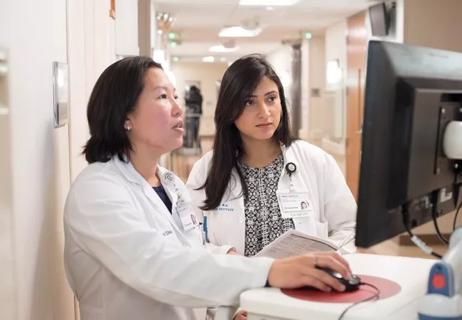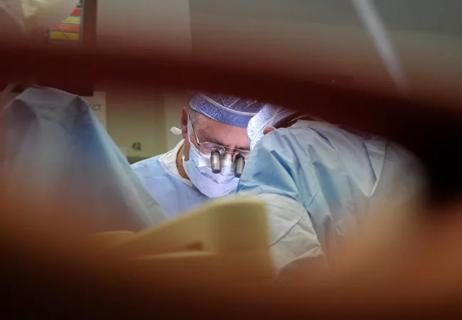Pulmonologist-scientist is awarded a $2 million grant from the NIH
Rachel Scheraga, MD, is part of a niche community within the physician workforce. She is a pulmonologist, critical care physician and scientist. In 2016, she received a Career Development Award from the National Institutes of Health (NIH) and more recently, in February 2021, her first independent grant — a five-year, $2 million grant from the National Heart, Lung, and Blood Institute, part of the NIH.
Advertisement
Cleveland Clinic is a non-profit academic medical center. Advertising on our site helps support our mission. We do not endorse non-Cleveland Clinic products or services. Policy
This grant will accelerate investigations into how components of lung tissue and the immune system cooperate to protect the lung from injury after infection.
“This is my first independent grant, which is a milestone in my career as a physician-scientist,” says Dr. Scheraga. This new award will build upon Dr. Scheraga’s previous research in the lab of Mitchell Olman, MD, which was supported by her NIH training grant.
The researchers identified that a protein called TRPV4 (transient receptor potential vanilloid 4) helps protect against infection-associated lung injury by regulating the activity of immune cells called macrophages.
“Our team was the first to show that TRPV4 controls essential macrophage functions after lung infection. This newest grant provides our team with the opportunity to expand our understanding of the mechanism by which TRPV4 controls immune cell function,” she explains.
Macrophages have become an important focus in the study to find new therapies for treating or preventing lung injury caused by infection. They envelop and destroy invading pathogens and stimulate the movement of other immune cells towards sites of inflammation and infection, essentially calling for backup.
Dr. Scheraga and others are now working to apply their knowledge about these mechanisms to both bacterial and viral infections, like those initiated by SARS-CoV-2; although, the long-term goal of her grant is to identify new biological targets for treating bacterial pneumonia-induced lung injury. Bacterial pneumonia takes the lives of between 40,000-70,000 individuals in the U.S. each year and affects over 1.2 million people.
Advertisement
Currently, there is no effective pharmacological therapy to protect the lungs against pneumonia-associated injury, although Dr. Scheraga is hopeful that this research will move the field closer to finding an actionable drug target.
On securing her first research project grant she says, “It’s a huge step and something I’ve been working toward for quite some time. With only about 15% or so of R01 applications funded, it can feel like the tiles are kind of stacked against you.”
The number of physician-scientists in the U.S. is shrinking. In response to this decline, some physicians are calling for renewed efforts to bolster interest and improve access to the clinical medicine-biomedical research career path.
Dr. Scheraga echoes the sentiments recently published by Suber et al. in theAmerican Thoracic Society (ATS) Scholar. The authors examine the shortage of physician-scientists in pulmonary, critical care and sleep medicine fields and offer strategies to enhance the pipeline, particularly for individuals who are under-represented in medicine.
For trainees who are early in their journey, she says mentorship and protected time are essential. A thriving research environment will foster both.
“I’m fortunate to be in a place that’s been so supportive of this transition. When you’re considering institutions, explore which places have a good track record of K award recipients. I cannot stress this enough — mentored funding, which allows your time to be protected, is very important, especially in basic science.”
Advertisement
Cleveland Clinic’s Respiratory Institute currently has five physician-scientists with K awards, all of whom are investigating pulmonary disease with basic, translational, clinical or population science methodologies. Institutional commitment to these investigations and building a robust pipeline of physician-scientists is, arguably, more important than ever given the current pandemic and the fertile ground for discoveries.
She also says it’s important to examine what you like to do.
“I like that I can do an experiment one day and see a patient the next day. For me, personally, understanding biology and mechanisms make me a better medical doctor. And I bounce ideas off of colleagues who are more clinically focused. These different perspectives ultimately benefit patient care,” she concludes.
Portions of this article were adapted from a Cleveland Clinic LRI News article.
Advertisement
Advertisement

Cardiologists offer professionals guidance for better sleep

Reduce stress by adopting mindfulness as a way of life

A Q&A with sports medicine physician Dominic King, DO

Reflections on providing all patient care with the same respect

3 Women's Professional Staff Association members field this question

Benevolence and nonmaleficence in self-disclosure

It's time to take care of YOU

A Q&A with Charles Miller, MD